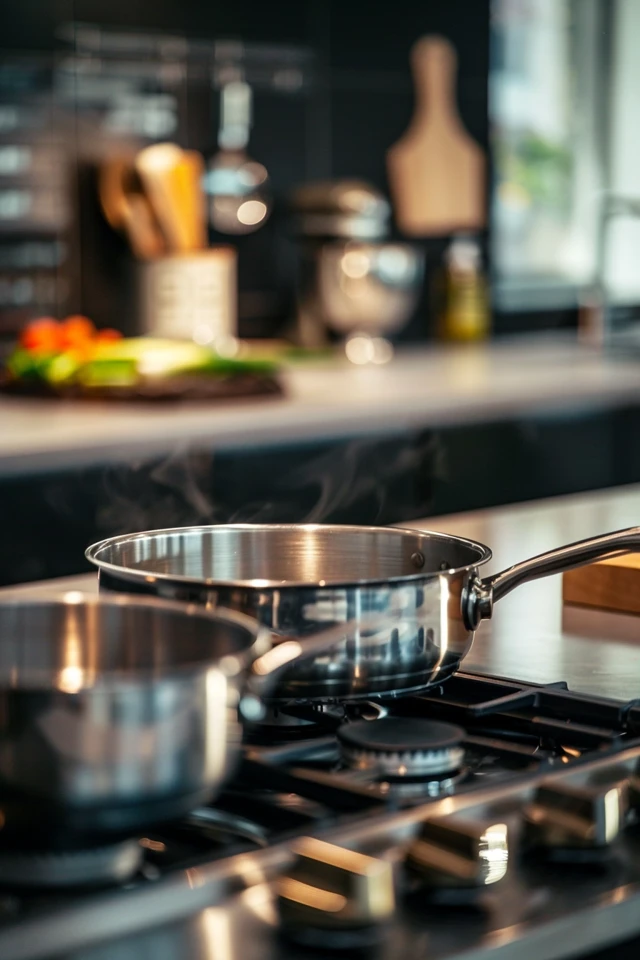Hello, I’m here to share some non-toxic cleaning tips on how to remove rust from your non-stick baking pan. Rust can be a frustrating problem, but with the right methods, you can restore your pan to its former glory. So, let’s dive in and discover some effective solutions to tackle rust on your baking pans.
Key Takeaways:
- Rust on non-stick baking pans can be removed using non-toxic cleaning methods.
- A mixture of baking soda and hot water can help eliminate rust.
- Creating a DIY rust spray using lemon juice is another effective option.
- It’s important to follow the manufacturer’s cleaning recommendations for non-stick pans.
- Prevent rust by thoroughly cleaning and drying your non-stick pan after each use, and apply a thin layer of cooking oil.
How To Remove Rust From Stainless Steel and Cast Iron Pans
Stainless steel pans and cast iron pans are known for their durability, but they can still develop rust over time. To keep your pans looking their best, it’s important to know how to remove rust effectively. Here are some cleaning tips to help you tackle rust on stainless steel and cast iron pans.

Cleaning Stainless Steel Pans:
To remove rust from stainless steel pans, you can create a paste with baking soda and water. Combine equal parts baking soda and water to form a thick paste. Apply the paste to the rusted areas of the pan, making sure to cover the entire surface. Let it sit for a few minutes to allow the baking soda to penetrate the rust.
After the paste has had time to work, use a scouring pad or sponge to scrub the rusted areas. Apply gentle pressure and scrub in circular motions. The baking soda acts as a gentle abrasive, helping to lift the rust without scratching the stainless steel surface.
If the rust persists, you can try boiling a mixture of baking soda and water directly in the pan. Fill the pan with enough water to cover the rusted areas, then add a tablespoon of baking soda. Bring the mixture to a boil and let it simmer for a few minutes. While the mixture is still hot, scrub the pan with a scouring pad or sponge to remove the loosened rust.

Cleaning Cast Iron Pans:
When it comes to cast iron pans, it’s important to avoid using water, soap, or acidic solutions like vinegar or lemon juice, as they can strip away the pan’s seasoning. Instead, opt for a gentle yet effective method using baking soda.
Start by covering the rusted areas of the cast iron pan with a layer of baking soda. Use a stiff-bristle brush or scouring pad to scrub the baking soda into the rusted areas. Apply firm pressure and scrub in circular motions until the rust starts to lift.
Once you’ve scrubbed away the rust, rinse the pan thoroughly to remove any leftover baking soda. Dry the pan completely with a towel to prevent moisture from causing further rusting. To protect your cast iron pan from future rust, make sure to season it by applying a thin layer of cooking oil.
Pro Tip: It’s important to note that cast iron pans require regular maintenance to prevent rust. After each use, hand wash your cast iron pan with minimal water and a brush or sponge. Avoid using dish soap, as it can strip away the seasoning. Instead, use hot water and mild scrubbing to clean off any food residue. After cleaning, dry the pan thoroughly and apply a thin layer of oil to keep it well seasoned and rust-free.
With these cleaning tips, you can effectively remove rust from your stainless steel and cast iron pans, ensuring they stay in great condition for years to come.

Tips for Preventing Rust and Maintaining Non-Stick Pans
While it’s important to know how to remove rust from non-stick pans, it’s equally important to take steps to prevent rust in the first place. After each use, make sure to clean your non-stick pan thoroughly with dish soap and warm water. Dry it off completely to prevent the development of rust.
To further prevent rust, you can apply a thin layer of cooking oil to the pan after cleaning and drying. This helps create a protective barrier against moisture. It’s recommended to oil your non-stick pans every 6 months, or more frequently if you use them daily.
Proper storage is also key in preventing rust. Keep your pans in a dry area away from moisture, such as near your sink or dishwasher. If you stack your pans, place a paper towel or pan protector between each piece to absorb moisture and prevent scratches. By following these tips, you can maintain the non-stick coating and prevent rust from forming on your baking pans.

